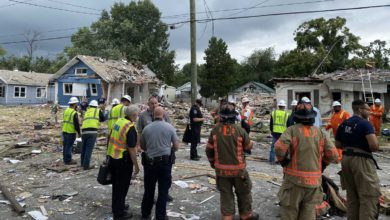
The COVID-19 vaccine has been scientifically proved to save lives, but for a select group of people in the religious realm, a more important matter is at stake – eternal salvation.
As the delta variant of the coronavirus spreads, many Americans resist COVID-19 vaccines, some citing the uncertainty of long-term side effects, others lacking trust in the medical field. Some vaccine resisters have been galvanized by the idea that the shot is the "mark of the beast."
The "mark of the beast" in the New Testament's Book of Revelation signals an allegiance to Satan or those who reject God's memorial of creatorship.
"Studies show that any conflicts between religion and science are not about facts, they are more about values and morals," said John Evans, a professor of sociology and religious studies at the University of California, San Diego.
What does the 'mark of the beast' scripture in Revelation say?
The apocalyptic biblical term comes from Revelation 13: 16-18. According to the Apostle John in the New International Version Bible, a pair of beasts will rule the Earth with cruelty. Their evil reach – which can be interpreted as hidden manipulation – will require all people who engage in commerce to wear the mark of the beast. The Apostle John did not identify what the mark looks like, although some theologians translate Scripture to associate the number "666" with it.

Pastor Darin Wood of First Baptist Church in the oil town of Midland, Texas, wrote an op-ed in August for the Midland Reporter-Telegram that said, "One of my church family posed an honest question: 'Pastor, is the COVID vaccine the mark of the beast? I’ve been told it is.' Their question was an honest and heartfelt one, and clearly, they were anguished about it. In kindness, I answered, 'no' and thought little more about it. Until the question came again. And again. And again.
Fact check:Ivermectin is not a proven treatment for COVID-19
'A nightmare':Pregnant unvaccinated nurse and her unborn 'sweet baby girl' die of COVID-19
"There’s no indication that the vaccine matches the mark described by the Apostle John. … I’ve been sent numerous articles and videos ... that (suggest) the vaccine represents a conspiracy of governmental control or that the vaccine contains some sort of marking agent to indelibly identify those foolish enough to receive the vaccine. It’s just not reasonable or logical to presume such a wide conspiracy is even possible. The question then arises as to why this wide mistrust in medical treatment has come."
Why do people call COVID-19 vaccine the 'mark of the beast?'
Evans said that lack of trust in the government and medical field is a driving force behind the "mark of the beast" belief.
"(Former President) Donald Trump tapped into American populism, and with that comes the disbelief of experts," Evans told USA TODAY. "There is a small group of people who believe in 'the mark of the beast,' and I think what's driving that thought process is starting with various concerns about receiving the coronavirus vaccine that are not specifically religious."
Evans said he suspects that the "mark of the beast" popularity stems from an adherence to a social or political identity.
Peter Feaman, a top Republican National Committee official in Florida, said last month that vaccines are "the mark of the beast" and comparable to a "false god." In May, Feaman wrote on his blog of Gov. Gretchen Whitmer encouraging vaccines in Michigan: "Diabolical Michigan Governor Whiter wants her citizens to get the Mark of the Beast to participate in society."
According to Evans' studies, the majority of "mark of the beast" believers appear to be politically conservative and from Protestant Christian backgrounds.
"People with spiritual beliefs that all things are influenced by religion are more likely to believe 'mark of the beast,' which is in every Christian's Bible, but people will focus on particular passages in the Bible to support their belief system," Evans said.
What do religious leaders say?
Harvest Christian Fellowship Pastor Greg Laurie said COVID-19 vaccines are not "the mark of the beast," but many Christians may believe they are, thinking the world is in what the Bible calls "the last days."
"The Bible speaks of someone identified as the 'Antichrist' and he will require people have a 'mark' that people will receive to buy and sell," Laurie told USA TODAY in an email. "The COVID-19 vaccine – or any vaccines – have nothing to do with any of this."
Laurie, who has been vaccinated, said the mark will be a pledge of loyalty to the Antichrist, and no one would take the mark unknowingly.
"In Revelation 14, we learn that those who take the mark are doomed," he said. "God will not doom people for taking something unwittingly."
Misinterpretations of Revelation 13:16-18 can stem from social media where people can spread unreliable information, according to Laurie.
"People read erroneous comments and believe they are true," he said.
"Sometimes these statements are packaged to look like Bible Prophecy," he said, "but they are false and misapplied because many people do not understand what the Bible actually says about these things."
What do health care workers say? Do people actually cite this as a reason to avoid the shot?
Nicole Williams, a traveling intensive care unit nurse, said she has heard the "mark of the beast" as a reason not to get vaccinated many times.
"I get being hesitant because it is new and we don't know the long-term effects, but calling it the 'mark of the beast' is crazy," Williams told USA TODAY.
Williams has worked in hospitals in Texas, New York, California and Hawaii in her three years as a nurse.
She said the latest surge of COVID-19 cases has been "hell," and a lot of younger people have died. She said vaccines are not a magical shot that cures all, but they're one of many tools to fight the virus.
"I understand that people want to get back to how things were, but calling something you don't understand the 'mark of the beast' is extreme and harmful," she said. "I'm exhausted and tired of seeing so many people die, but I will do my damnedest to try and keep my patients alive."
Emergency room physician Stephen Smith at Hennepin Healthcare told USA TODAY he hasn't heard the 'mark of the beast' as a reason to not get vaccinated but a few other outlandish reasons.
Smith said one woman brought her child in for a fever and cough, and he explained that the toddler might have COVID-19. When he asked the mother if she had been vaccinated, Smith said her response was "Oh no, that turns you into a zombie."
Other reasons Smith has heard for not getting vaccinated include: not wanting to get microchipped, it's outside their world view, vaccines were developed too fast, they haven't gotten sick, they're not high-risk, they don't trust the government and they read that people have died from the vaccine.
"Social media plays a 100% role in the misconceptions about the vaccine," Smith said. "They get all their information off Facebook and get all this garbage.
"Anyone who is telling you not to get the vaccine is either lying to you or an idiot or a combination of the two."
New COVID-19 variant:What we know about the mu variant and why Fauci is 'keeping a very close eye on it'
What we know about the COVID-19 vaccines?
Peer-reviewed data has deemed the Moderna and Pfizer-BioNTech COVID-19 vaccines safe, and they demonstrated 94% to 95% effectiveness against the virus, according to a study published in the New England Journal of Medicine.
The same journal published that the Johnson & Johnson single dose shot provided protection against the virus and was effective against hospitalization and death.
On Sept. 20, Pfizer BioNTech released data that its vaccine was safe for children ages 5 to 11. The company received its full stamp of approval from the Food and Drug Administration late last month.
Moderna has begun the process of applying to get a full license, and Johnson & Johnson plans to apply this year.
The Centers for Disease Control and Prevention reported that 54.7% of Americans are vaccinated and 63.9% have received at least one dose.
By the end of September, 56% of people in the USA are projected to be fully vaccinated and 59% by Jan. 1, 2022, according to data from the Institute for Health Metrics and Evaluation.
Source link









